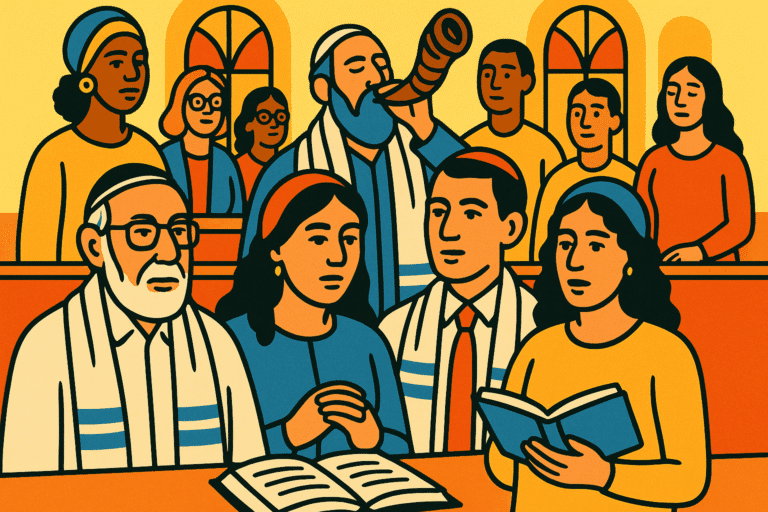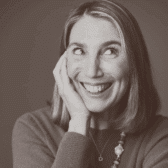
I can’t believe the High Holidays are rolling around again. Even though this is traditionally a time for optimism — a chance to inscribe ourselves and our loved ones in the Book of Life — Rosh Hashanah and Yom Kippur have always been tinged by sadness for me.
It was after Rosh Hashanah services and a family dinner with our best linens and chocolate-covered coffee beans in silver candy dishes that my parents told me they were getting a divorce when I was 14 years old. The newly-polished forks were still on the table.
It was just before the high holidays when I was 25 years old that my best friend and college roommate died on 9/11; she worked in the North Tower and disappeared without a trace that crisp fall day. My mother flew up to Boston to be with me at school days later. She was one of the only people on a commercial flight that day; the airport was empty so soon after the terrorist attack, just so we could be together to recite the prayers and dip the apples in honey.
Perhaps it should come as no surprise that exactly 25 years after my parents’ announcement, I officially separated from my ex after Yom Kippur services. The events of October 7, too, fall around this time. Now, the holidays are tinged with sadness, loss, and melancholy — not just for me, but for every Jew.
How do I personally handle it? I work. I write. I reflect. I atone for my many missteps, always wishing I’d been a better wife, a better mom, a better friend. I throw myself into helping others. And I try to give a sense of hope in a dark, uncertain time. Hope comes from seeing a path forward.
And I do see a path out of the darkness.
The first step? Uniting and connecting with our own community.
Last year, the book I edited and published, “On Being Jewish Now: Reflections from Authors and Advocates,” had just come out on October 1. The publication and subsequent gatherings with Jews, eager readers, and other authors provided me with a positive outlook for the first time in months. Connecting with others brought me back to the more joyous days of the holidays, back when picking my preteen outfit was the most emotionally charged event, not hostages and unfettered Jew hatred.
I surrounded myself with the contributors: voices of authors who had been on my podcast and had become friends over the years, as well as many new friends from Australia, Israel, and beyond. What bound us together was the desire to share what being Jewish means in a post–10/7 world — stories only we could tell, of joy and heartache, loss and love, friendship and betrayal, celebration and mourning.
We gathered on the pages first, and later, in person, around the globe, to build unity among our shattered, shocked peers. After Oct. 7, of course, Jews were left wondering what to do, where to go, who to trust, when to flee. We were cast out of our industries, alienated from friend groups, and fearful for our lives — not just because of the attacks, but also from the world’s response to them. In an isolating time, thanks to the anthology, I’d never felt less alone. I want to spread that magic more widely.
Things have only gotten worse. Speaking up, which I’ve been doing for almost two years now, seems to have had zero impact as protests gather steam, as crowds grow in every corner of the globe. Nowhere appears to be off limits, the antisemitism oozing through every highway and byway, every canal and corridor.
After picking up one of my kids from camp in Maine this summer, as we drove through a tiny town with just a couple of storefronts, far from a city of any kind. A group of about 20 locals gathered on Main Street, lofting anti-Israel picket signs, their pale, wrinkled skin and shock of white hair peeking out as they chanted and looked into our car, assuming we felt the same way. One even gave a thumbs up. A thumbs up?!
An antisemitic mayor is poised to take over New York City. Groups protested Gal Gadot’s appearance on the red carpet at the Venice Film Festival simply for being Israeli. The embassy in Athens was desecrated. Synagogues in Australia, burned. And a maniac scrawled “6 million wasn’t enough” on his gun before murdering innocent children in Minneapolis. The hostages have been in captivity for more than 700 days.
I mean, seriously. What the heck? Are we foolish to seek hope?
No, we are not foolish. Hope is required. Hope is essential. Hope is our lifeblood. We can make things better. There are things we can do. Hope comes from action. Ownership. Autonomy. We must tackle the division among Jews to reinforce our tribe and help us form a tighter-knit web, like schoolchildren arm-in-arm blocking opponents in a game of “Red Rover, Red Rover.”
I’ve gotten into it via email, DM, and in conversation with fellow Jews who brazenly support the opposition. Of course, no one wants anyone else to suffer, no matter where they live. War is terrible. But this is war, isn’t it? Israel is the only nation charged with taking care of the people it’s fighting against. Why? Jews who condemn Israel without seeking nuance or facts just add fuel to the fire on the other side; they have enough ammunition through their calculated social media infiltration and decades-long campaign against democracy.
Jews need to protect our own, not join the herds who think this is the chic cause du jour (case in point: Hannah Einbinder’s Emmy acceptance speech as a Jew when she called out, “Free Palestine”). Infighting can’t be the thing that takes us down. We have to get our acts together. We must unite. We need to stop bickering over who should or shouldn’t be in office or which political party we adhere to, and instead strengthen our own party.
Because that is what we are. We are a horah-dancing party, a people, a tribe. We live among citizens of other nations, but ultimately that isn’t who we are. Like it or not, we are all children of Israel. Our courtyard squabbling just has onlookers laughing at us through the chain link fences. Enough already. Let’s remember what connects us: family, Shabbat, giving back, our shared values, our history. Not the political decisions of those in office.
A second concrete step is taking action to help others. We don’t all have to be public in our attempts. We don’t all have to post on Instagram, write essays, attend marches, or write books. But everyone has to make an effort. How? Find the way that fits you best. Use creativity, intellect, education, kindness, and generosity to support causes and create helpful missives. Give back. Be engaged. Show up. It is absolutely essential. Jews everywhere must feel this sense of urgency. By taking action, however, we can — in schools, JCCs, synagogues, workplaces, organizations, friend groups — have a profound effect on our community as a whole.
The third and final thing that we need is a plan and leadership. People show up in droves to every event I speak at about my book because they are desperate for answers and direction, craving connections that will likely be lifesaving. So who exactly are our leaders? Is it the new crop of Jewish influencers on social media? The government, in the United States and in Israel, is leading, yes, but no one is addressing us, the diaspora Jews, directly. Who is running the show? We need a spokesperson. A leader.
I think rabbis must step up even higher during the High Holidays and be key leaders with a coordinated community communication plan, joining forces with local leaders of JCCs and Federations, to form some type of Jewish board. We could establish a de facto parents association for Jews with class, grade, and school reps. The board could send out a weekly newsletter, establish a phone tree for emergency updates, and send out a suite of social assets and talking points. Equip us all with the tools and weapons to fight back, not in war but in words.
At a minimum, we need to know, as a group, that we are all in the same boat, craving next steps, needing them for our survival. We are a small but mighty tribe working on the biggest group project assignment of our lives. The deadline is now.
Originally Published Sep 17, 2025 05:51PM EDT


